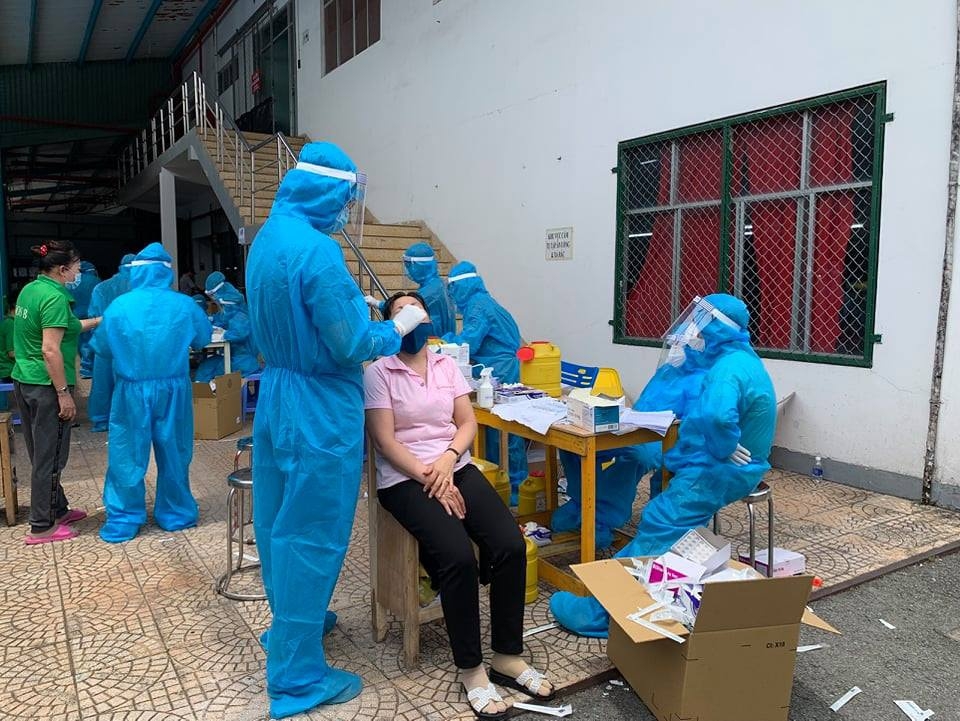Supply chain crisis ahead for top brands
 |
| Employees of Changshin Vietnam Company are taken samples for Covid-19 testing. Source: Le Lam/ thanhnien.vn |
Nike could soon face a shortage of sneakers as two suppliers – South Korea’s Changshin Vietnam and Taiwan’s Pou Chen Corporation – have had to cease operations because of coronavirus infections.
Nike itself does not have factories in Vietnam but it has extensive operations in the country through contracts. Nike is also one of the largest indirect foreign employers in Vietnam.
Nike Vietnam’s sustainability manager Cuong Luong said that the athletics brand has around 200 suppliers in Vietnam which include finished goods, materials, footwear, apparel, and accessories. Its labour-intensive suppliers employ 500,000 workers.
“Nike manages our suppliers across the country. Some factories in the nothern provinces of Bac Giang and Bac Ninh faced serious impacts over the past few months, and now the pandemic has hit suppliers in Ho Chi Minh City, and nearby provinces of Binh Duong, Dong Nai, and Long An,” Luong added.
According to a report by S&P Global, about 50 per cent of Nike footwear products were sourced from Vietnam in the fiscal year 2020. Overall, the country accounted for 49 per cent of Nike’s imports into the United States in the second quarter of 2021.
Taiwanese Feng Tay Enterprises is the latest Nike supplier to pause its operations. Feng Tay counts Vietnam as its biggest footwear manufacturing base, accounting for 52 per cent of its total capacity.
In addition to supply chain headwinds, the athletics brand and its suppliers will bear more cost burdens such as the testing and quarantine costs, as well as expenses to prepare food and basic accommodation for workers to stay on site.
Other major sneaker brands could face similar obstacles as they also source footwear from Vietnam. Pou Chen’s Pouyuen Vietnam factory, which also makes footwear for Adidas, has halted operations for 10 days as of late last week. Meanwhile, Wolverine World Wide Inc., owner of the Saucony brand, along with Puma, had the most significant second-quarter increase of Vietnamese imports at 160.7 and 122.7 per cent, respectively, according to S&P Global report.
Textile supplier Eclat Textile Company, which counts Nike and Under Armour Inc. among its clients, said it is looking to reopen operations at its Vietnamese facilities and is yet to calculate the impact of the latest outbreak on the business.
Likewise, home decor manufacturer Ching Feng Home Fashions Co., Ltd., which produces curtains for Walmart and Ikea, also paused operations at its factories in Binh Duong for two weeks. The company acknowledged the challenges to meet requirements so that employees can live, work, and eat on site.
Board manufacturer ASRock, whose clients include Netflix, announced that its outsourced factories in Binh Duong temporarily ceased operations because they cannot yet comply with local pandemic prevention principles. They will coordinate with other outsourced factories to increase production capacity. However, it is estimated that the shutdown of outsourced factories in Vietnam will affect July revenues by 5-20 per cent.
RMIT lecturer Daniel Borer said, “Vaccination is key to return to full economic activities. Vietnam would be at a disadvantage if supply chains are disrupted and the country remains closed as a measure to prevent the virus spread, while other countries in the region open up thanks to successful vaccination programmes.”
The manufacturing situation in Ho Chi Minh City, Binh Duong, Dong Nai, and Long An remains serious, with record infection cases occurring on a daily basis last week. After 15 days of social distancing on July 23, Ho Chi Minh City planned to adopt stronger social distancing measures under Directive No.16/CT-TTg. Meanwhile, all southern localities have been placed under social distancing protocols from July 19.
Tran Viet Huy, managing director of Tracimexco - Supply Chains and Agency Services JSC, told VIR that further supply chain disruption is on the horizon with more F0 cases being detected at important areas such as seaports, customs, and factories.
In addition, there is also a large number of container backlogs at ports. “This, coupled with infection cases at airports and seaports, will exacerbate disruptions. Although goods are still circulating, the supply chain headwinds are really a major threat to businesses,” Huy added.
Some even fear that such disruptions in Vietnam and elsewhere in Asia will ripple through supply chains that extend to the US and Europe, causing more delays and shipping cost increases. The JPMorgan Global Manufacturing purchasing managers’ index (PMI), which is produced by British information provider IHS Markit, indicated that June saw the worst deterioration in suppliers’ delivery times in the history of the series stretching back almost 24 years.
IHS Markit’s PMI survey for Vietnam showed that confidence in the outlook for manufacturing activities took a hit in June alongside falling output, and confidence was the lowest since August last year.
What the stars mean:
★ Poor ★ ★ Promising ★★★ Good ★★★★ Very good ★★★★★ Exceptional
Related Contents
Latest News
More News
- Foreign leaders extend congratulations to Party General Secretary To Lam (January 25, 2026 | 10:01)
- 14th National Party Congress wraps up with success (January 25, 2026 | 09:49)
- Congratulations from VFF Central Committee's int’l partners to 14th National Party Congress (January 25, 2026 | 09:46)
- 14th Party Central Committee unanimously elects To Lam as General Secretary (January 23, 2026 | 16:22)
- Worldwide congratulations underscore confidence in Vietnam’s 14th Party Congress (January 23, 2026 | 09:02)
- Political parties, organisations, int’l friends send congratulations to 14th National Party Congress (January 22, 2026 | 09:33)
- Press release on second working day of 14th National Party Congress (January 22, 2026 | 09:19)
- 14th National Party Congress: Japanese media highlight Vietnam’s growth targets (January 21, 2026 | 09:46)
- 14th National Party Congress: Driving force for Vietnam to continue renewal, innovation, breakthroughs (January 21, 2026 | 09:42)
- Vietnam remains spiritual support for progressive forces: Colombian party leader (January 21, 2026 | 08:00)

 Tag:
Tag:




















 Mobile Version
Mobile Version